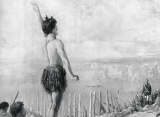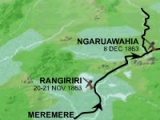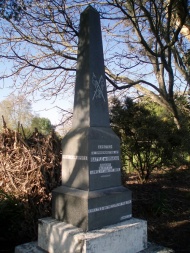Events In History
-
 31 March 1864Rewi's last stand?
31 March 1864Rewi's last stand?The last battle of the Waikato War began when the spearhead of a strong British force charged an apparently weak Māori position at Ōrākau, south-east of Te Awamutu. After two frontal assaults failed, the British besieged the pā. Read more...
Articles
Emotions in history: 'difficult histories'
War in Waikato

After fighting broke out again in Taranaki in early 1863, Governor George Grey turned his attention to the region he saw as the root of his problems with Māori: Waikato, the heartland of the anti-landselling King Movement. Grey vowed to ‘dig around’ the Kīngitanga until it fell.
- Page 6 - The Battle of ŌrākauJames Belich argues that the British victory at Ōrākau was also their ‘cruellest disappointment of the entire war’. Chris Pugsley, on the other hand, sees Ōrākau as the
Historic battle site 5 km along the Kihikihi–Arapuni road. By March 1864 the British had control of Waikato, but Rewi Maniapoto led further Māori resistance. A force of 300 Māori built a pā at Ōrākau. It was besieged by nearly 1,500 troops between 31 March and 2 April. Short of water, food and ammunition, the defenders were forced to fire peach stones and fragments of metal and wood. Meanwhile, the troops shelled the pā and began digging a sap – a zigzag trench – to try and breach its walls. On 2 April British commander General Duncan Cameron gave the Māori a chance to surrender. He received the famous reply: ‘E hoa, ka whawhai tonu mātou, Āke! Āke! Āke!’ (Friend, we will fight on forever, forever and forever!). Shortly after this, the sap reached the pā and the occupants abandoned it. Many were killed retreating south, and others who were captured, including women, were bayoneted. The events of Ōrākau were gradually mythologised, and when a monument was erected with much ceremony on the site in 1914, 50 years after the siege, it was Māori heroism rather than British ferocity that was remembered.




